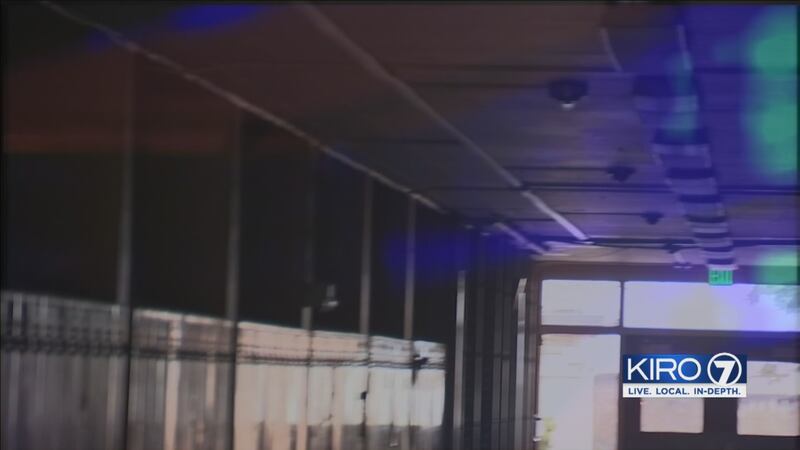A voice message that would make any parent's heart stop. But it wasn't a drill.
Someone had threatened to hurt kids at several Seattle schools.
Now some parents are worried about the long-term impacts when their child's school goes into lockdown.
Seattle schools were placed on lockdown six times since September 2017.
The threats proved to be a hoax. But experts say the impact on the children who go through a school lockdown can be long lasting.
Madeline McCarthy is a sixth-grader at Whitman Middle School in Seattle.
She was in class when her school went into lockdown.
Her teacher ushered them to the back of the room.
"He turned the lights off," said Madeline. "And we kind of just stayed that way for probably 15 minutes." No one told them what was going on, she said.
"No they didn't."
And then the rumors started.
"One kid in particular had started spreading a rumor about it," Madeline said, "that there was someone outside with a gun. And that just made everybody more nervous."
When they were finally allowed access to their cellphones, Madeline began sending text and voice messages to her mother.
"So she writes 'I love you,'" said Shannon McCarthy. "And then she's got this worried face. And I wrote back, 'Are you OK? I love you, too.' And then she sends this message."
"There's a lockdown drill in school," Madeline says through the phone. "I just want you to know I love you."
"That really scared me," said Shannon. "She's a pretty confident kid. And to hear the worry in her voice and that they were having a lockdown was kind of the worst fear of a parent."
Madeline and her classmates at Whitman Middle School were not alone.
That November day, several Seattle schools went into lockdown because of the same ominous threat.
It turned out to be a hoax. But in a sense, the damage was already done.
Active shooter drills and lockdowns are a part of the fabric of the lives of America's schoolchildren.
Yet, by one estimate, fewer than 150 children and adults have been killed in schools since the deadly Columbine High School massacre 20 years ago. But last year, an estimated 4.1 million students lived through at least one lockdown or drill.
And the impact goes far beyond the school house door.
"It was a difficult moment, one that I will never forget," said parent Shelley Reed from her home in Delaware.
Her second-grade daughter came home from a school lockdown with a message written on her arm.
"She wrote 'love Mom and Dad,'" said Reed.
"And so I asked her,
I said, 'You know why'd you write that?'
Scroll down to continue reading
More news from KIRO 7
- Issaquah School District, teen in picture respond to racist photo
- Amazon moving entire operations team to Bellevue
- Bolt cutters, acid, a blender: California man charged with torutre killing of missing 8-year-old son
- Wild police chase, violent crash caught on camera
- Do you have an investigative story tip? Send us an email at investigate@kiro7.com
And she said, 'Because I was scared if the bad guy got to us and I got killed' -- I hate saying it; I get emotional every time -- 'I want you and Daddy to know that I love you.'"
Her Facebook post about it went viral.
"It's a terrible thought to know that our young kids are in school and they don't feel safe," she said. "And it's heartbreaking."
"See, that was a point of panic," said Dr. Gregg Jantz, an Edmonds-based mental health expert. "That was a memory point that's going to be there for a long time."
Jantz says the effects of school lockdowns can last long after the all clear has been given.
"Let's say you have a kid who's already had a lot of trauma in their life," he said. "And so now we are practicing some drills that can be a real trigger point for them and bring up past trauma. So I believe there's a side of this we need to be aware of. That we can create more anxiety in a kid depending on where they are developmentally, maybe where they are academically their own vulnerabilities.
So I some think it's something for us to be aware."
He says that anxiety can make a child unable to eat or sleep days later.
He suggests parents gently talk to their children even after school shootings someplace else.
He does that with his own teenage son.
"I ask a lot of open-ended questions," he said. " 'What did your friends talk about? Or what did you hear? Did you guys talk about anything in the news today?' So I want to always start from the place how much information does my child know versus me giving them too much and overloading them and kind of pushing them over the edge. And remember they're going to absorb our anxiety."
Madeline McCarthy says some of her classmates cried during the lockdown.
"I mean, it's not something you can easily forget," said Madeline.
The teacher let them talk about it the next day.
She says that helped "a little. Probably what helped most was just the conversations with my mom just talking about what happened and just sharing all the information I knew and just how I felt."
It affected her mother, too. "After it was all said and done," said Shannon McCarthy, "it was a scary experience, but we're fine."
But neither of them looks forward to experiencing any of it again, the ominous messages from Madeline still ringing in her ears.
"I just hope they don't keep us after school," she said in her last voice message that day. "If they do, please be home when I get there. I would really like to ask ... You know what? Okay.
Bye."
Cox Media Group








